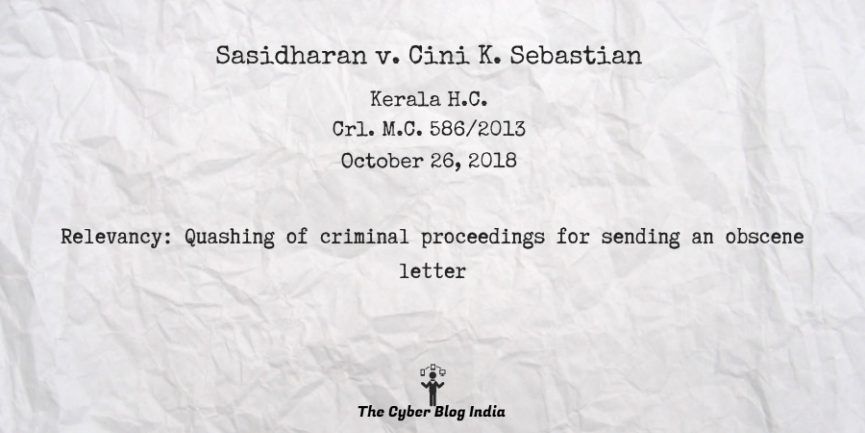Sasidharan v. Cini K Sebastian

Sasidharan v. Cini K. Sebastian
In the High Court of Kerala
Crl. M.C. 586/2013
Before Justice K. Abraham Mathew
Decided on October 26, 2018
Relevancy of the case: Quashing of criminal proceedings for sending an obscene letter
Statutes and Provisions Involved
- The Information Technology Act, 2000 (Section 66A)
- The Indian Penal Code, 1860 (Section 189, 201, 294(b), 353, 500, 509)
Relevant Facts of the Case
- The first accused is the proprietor of Food Court Caterers at Chalakkudy. The authorities had imposed a penalty on him under the Kerala Value Added Tax Act in 2012.
- The respondent, who was working as Intelligence Officer in the Commercial Taxes Section of the Sales Tax Department, issued a notice demanding him to furnish security to her satisfaction as contemplated in the stay order passed by the appellate authority.
- The first accused sent her a letter challenging her authority to demand security from him. The letter contained obscene words. The computer print of this letter was taken from the computer of the petitioner (third accused).
- The second accused took copies of the letter from the prosecution witness’s office.
- The proceedings are sought to be quashed under the ground that most of the offences are non-cognizable and the learned Magistrate committed illegality in taking cognizance of the offences on the police report.
Opinion of the Bench
- All offences, except those under Section 294(b) and 353 of the Indian Penal Code, 1860, and Section 66A of the Information Technology Act, 2000 are non-cognizable. Section 66A has been struck down by the Supreme Court in Shreya Singhal v. Union of India in 2015. The letter attached in Annexure ‘R1(a)’ sent by the first accused to the respondent does not contain any obscene words. It is clear that a cognizable offence is not committed. The words in the letter attached in Annexure ‘R1(a)’ may attract Section 500 of the Indian Penal Code, 1860, which is a non-cognizable offence.
Final Decision
- Petition allowed.
- Proceedings quashed.
This case summary has been prepared by Shrawani Mohani, an undergraduate student at ILS Law College, Pune, during her internship with The Cyber Blog India in January/February 2021.
